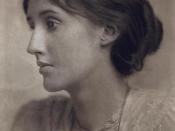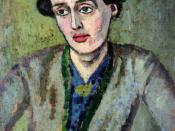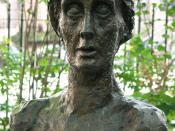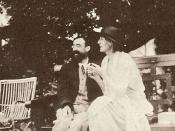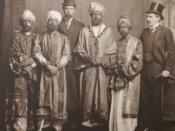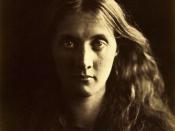Three Guineas is an important essay written by Virginia Woolf in 1938, a famous feminist writer in England. In this essay, Woolf responds to a letter she receives from a prominent London lawyer asking her to contribute three guineas toward a fund to prevent war -- one for building a women's college, one for promoting women's employment, and one to prevent war and protect intellectual liberty. She lays out a vision of women's education and economic independence as the foundation of social equity and justice.
In this essay, Virginia Woolf addresses the "professions of educated men" and their utter lack of ability to prevent war. Woman is under the constraint of socially constructed expectations and roles. The split between the private and the public realms is putting women in a disadvantageous position. Woolf says:áñáàThere are two worlds in the life of the nation, the world of men and the world of women.
Nature has done well to entrust the man with the care of his family and the nation. The woman's world is her family, her husband, her children, and her home'. Woolf not only rejects the patriarchal system, but also articulates the need of women's integration in the public sphere if they are to prevent war. But this creates dilemmas for women, as she says, áð...we daughters of educated men, are between the devil and the deep sea. Behind us lies the patriarchal system: the private house, with its nullity, its immorality, its hypocrisy, its servility. Before us lies the public world, the professional system, with its possessiveness, its jealousy, its pugnacity, its greed. (...) Each is bad. Had we not better plunge off the bridge into the river; give up the game; declare that the whole of human life is a mistake and so end it?áñ The exclusion of women from the professions makes woman to be áîoutsideráï. The society exempts woman from full participation in difficult decisions such as on military matters. Woolf says:áñ ...You are fighting to gratify a sex instinct which I cannot share. To procure benefits which I have not shared: but not to gratify my instincts, or to protect either myself or my country... For, the outsider will say, in fact, as a woman, I have no country. As a woman I want no country. As a woman my country is the whole world.áñ Woolf sets out on the premise that war is a male enterprise and that peace is a female thing:áñ To fight has always been the manáïs habit, not the womanáïs. Law and practice have developed that difference, whether innate or accidental. Scarcely a human being in the course of history has fallen to a womanáïs rifle; the vast majority of birds and beasts have been killed by you, not by usáñ She thinks that war will be avoided in the future only if women are given the same education as men and are permitted to earn their own living, as each of these liberations will free them from the necessity of marriage and its concomitant subscription to the dominant ideology of their husbands and will give them an independent opinion and a voice with which to utter that opinion: áðFor to help women to earn their livings in the professions is to help them possess that weapon of independent opinion which is still their most powerful weapon. It is to help them have a mind of their own and a will of their own with which to help you to prevent war.áñ Nowadays, there are still wars in the world. Woman still doesnáït play an important role in difficult decisions especially military matters. But through the same education as man, woman can achieve independence, have a recognized voice with which to express those ideas instead of being relegated to silence and unite in opposition to man-made war.
